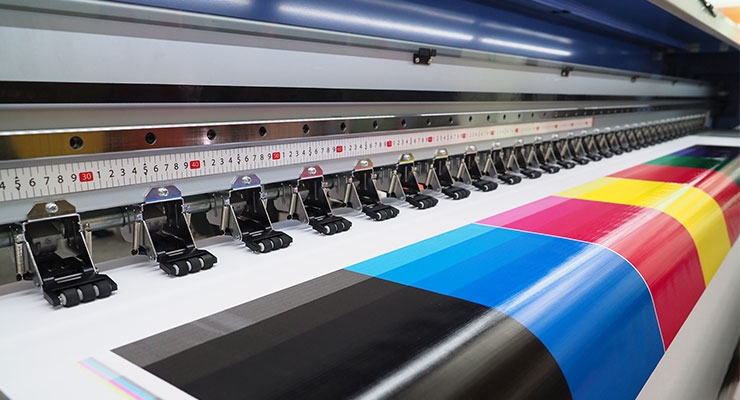What Does Digital Printing Do?
What Does Digital Printing Do?
Blog Article
The Single Strategy To Use For Digital Printing
Table of ContentsHow Digital Printing can Save You Time, Stress, and Money.Things about Digital PrintingGet This Report about Digital PrintingUnknown Facts About Digital PrintingThe Greatest Guide To Digital PrintingWhat Does Digital Printing Mean?Digital Printing Things To Know Before You Get ThisFascination About Digital Printing
Personalization likewise enables services to attract attention in a congested market by producing special advertising materials that differentiate them from their competitors. One of the main benefits of digital printing is the ability to publish variable information. Each printed piece can be one-of-a-kind, permitting companies to produce customized advertising and marketing products that speak straight to their target audience.Digital printing also enables for customization in the layout of advertising products (Digital Printing). With digital printing, businesses can develop styles that are one-of-a-kind and tailored to their details needs.
The Basic Principles Of Digital Printing
By publishing smaller sized quantities of advertising materials, services can minimize waste and prevent the demand for excess inventory. Digital printing is also versatile.
By making use of various products and formats, services can produce special advertising and marketing products that stand apart from their competitors and draw in focus from their target market. Digital printing also offers consistency. With standard printing techniques, there is often variant in between prints due to differences in ink insurance coverage, stress, and other factors.
This consistency can assist build consumer trust fund and credibility, revealing that business is devoted to providing high-quality products. Consistency is specifically vital for organizations that intend to build consumer trust and reliability. By ensuring that every print is regular, companies can reveal that they are devoted to supplying premium materials and focusing on the details.
How Digital Printing can Save You Time, Stress, and Money.

Furthermore, electronic printing produces less waste since it can print on demand and in smaller sized amounts, decreasing the requirement for excess stock and materials. Digital printing likewise utilizes less power compared to traditional printing approaches. Digital printers do not need as much power to operate, as they do not need to warm up as a lot or make use of as much power to run.
The Single Strategy To Use For Digital Printing

Balanced out printing calls for a plate for each shade published. Traditional countered my site printing is a print method that utilizes light weight aluminum plates to transfer ink onto a rubber sheet (often referred to as a "covering"). The photo is then rolled onto the printing surface. This printing technique is taken into consideration "countered" since the ink is not moved to the paper straight.
The Buzz on Digital Printing
The tools's set-up costs are high originally, extra systems become reasonably less costly as the quantity boosts. Balanced out printing enables for a wide variety of print materials to be utilized throughout production. It permits the printer to utilize various paper types, custom-made surfaces, and different inks. The top quality pictures created through balanced out printing make it the preferred method, especially amongst visuals developers, when looking for the best shade reproduction, detail, and professional-looking prints.
The basic printing technique stays countered. For digital inkjet printing, ink is transferred straight onto the surface area. As opposed to counting on light weight aluminum plates and rubber coverings to transfer an image, digital printing uses fluid ink throughout manufacturing. Typical home inkjet printers are just one of one of the most typical electronic printing approaches.
Our Digital Printing Statements
Better color fidelity describes both the accuracy of the colors and their balance in the design. Because balanced out printing can blend custom-made shade inks for each job, it will naturally obtain the shades spot-on. Works just as well on visit our website nearly any kind of type of material. Dependable, superior photo high quality. Count on offset printing for tidy, unique kinds and images without touches or areas.
It costs a great deal to begin a countered task. You need to spend cash right into producing home plates, which takes some time. When you've invested it, all of the materials are all set to go, and you'll invest less on big balanced out tasks than a digital print, which is concerning Bonuses the exact same per item no issue exactly how large the task gets.
Digital printing is less pricey for low-volume work. The price per unit drops for electronic printing, so at some point, they crisscross. Transforming information within a single print job.
Some Known Facts About Digital Printing.
While digital printing or inkjet printing is the recommended selection in the present times, there are compelling factors to transform from countered to electronic printing systems. When printing countered or electronically, critical decisions and processes are involved in shade matching.
Industrial inkjet printing offers adaptability for printing on lots of various substrates. Digital printing is excellent for clients that do not require longer runs and warehousing materials.

One advantage of electronic printing is picking from a variety of electronic substrates. With balanced out printing, substrates compose, typically, 30% of the price of the job. With digital printing, the cost of the substrate in the general task is small. This enables more choices than ever previously, which benefits marketing professionals and services.
The Main Principles Of Digital Printing
drop-on-demand is the second printing technology to consider. Continual inkjet systems require significant upkeep, more operator training, and higher downtime. Devices costs in inkjet printing are far lower than countered printing as there are no plate-making, plates, and press costs. Beyond the funding expenditure, the prepress equipment and printing presses require highly skilled drivers in countered printing, which adds labor prices.
Report this page